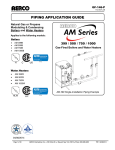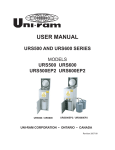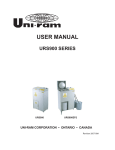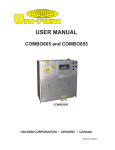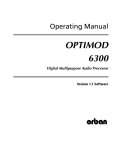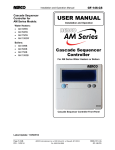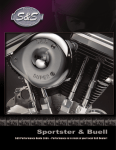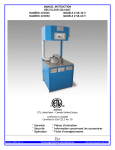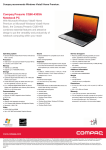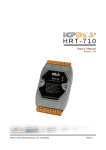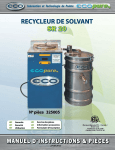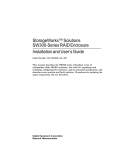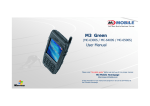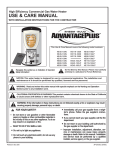Download OPERATING AND SERVICE MANUAL FOR - Uni
Transcript
OPERATING AND SERVICE MANUAL FOR SOLVENT RECYCLER AND GUN CLEANER COMBO SYSTEM MODEL EXPLOSION PROOF, AND INTRINSICALLY SAFE U.S. PATENT No. 4,785,836 & 5,876,567 MANUFACTURED BY UNI-RAM CORPORATION ONTARIO, CANADA COMBO455S – JUNE 2003 CONTENTS 1. GENERAL PAGE NUMBERS 1.1 INTRODUCTION............................................................................ 3 1.2 WARRANTY REGISTRATION ...................................................... 3 1.3 SYSTEM SPECIFICATION ........................................................... 4 A. SPRAY GUN CLEANER B. SOLVENT RECYCLER C. SOLVENT TRANSFER SYSTEM 1.4 ACCSESSORIY KIT ..................................................................... 5 1.5 OPTIONAL PARTS AND ACCESSORIES ................................... 6 1.6 STRUCTURE AND KEY COMPONENTS ..................................... 6 1.7 BEFORE USING ........................................................................... 6 1.8 SET UP AND PREPARATION ...................................................... 7 1.9 WORKING PRINCIPAL ................................................................ 9 2. SPRAY GUN CLEANER 2.1 CLEANING OPERATION INSTRUCTIONS ................................. 10 2.2 OPERATING TIPS......................................................................... 12 2.3 EFFICIENT USE OF GUN CLEANER ........................................... 13 2.4 DAILY MAINTENANCE - SOLVENT LEVELS ............................. 13 2.5 TROUBLE SHOOTING GUIDE ...................................................... 14 2.6 DIAGNOSTIC PROCEDURES ...................................................... 17 2.7 FLOW DIAGRAMS ........................................................................ 18 2.8 PARTS LISTS FOR GUN CLEANER ............................................ 19 2.9 PARTS ILLUSTRATION.................................................................20 3. SOLVENT TRANSFER SYSTEM 3.1 GENERAL .................................................................................... 21 3.2 OPERATING INSTRUCTIONS ................................................... 21 3.3 TROUBLE SHOOTING GUIDE ................................................... 22 COMBO455S – JUNE 2003 - Page 1 4. SOLVENT RECYCLER 4.1 SAFETY .........................................................................................23 4.2 BEFORE USING ............................................................................ 23 4.3 PREPARATION ............................................................................. 23 4.4 CONTROL PANEL........................................................................ 25 4.5 ERROR CONDITION CODES....................................................... 25 4.6 SETTING THE BOILING TEMPERATURE................................... 26 4.7 READY & RUN MODE.................................................................. 26 4.8 DISTILLATION PROCESS ........................................................... 27 4.9 REGULAR MAINTENANCE ......................................................... 27 4.10 MAINTENANCE AND SERVICE................................................. 29 4.11 TROUBLE SHOOTING GUIDE …………………………………… 29 z ERROR CONDITION CODES z SYMPTOMS AND SOLUTIONS z FUNCTION CHECK AND CALIBRATION 4.12 FUSE REPLACEMENT PROCEDURES ................................... 32 4.13 ELECTRIC WIRING DIAGRAM .................................................. 33 4.14 PARTS LIST FOR SOLVENT RECYCLER ............................... 34 4.15 PARTS ILLUSTRATION ............................................................ 35 5. SERVICE AND WARRANTY 5.1 WARRANTY REGISTRATION ..................................................... 36 5.2 SERVICE HOT LINE .................................................................... 36 5.3 WARRANTY TERMS ................................................................... 36 WARNING DO NOT SMOKE, OR USE NEAR AN OPEN FLAME OR SPARKS. DISCONNECT ALL POWER SOURCES (AIR OR ELECTRIC) BEFORE PERFORMING MAINTENANCE SERVICE. DO NOT RECYCLE NITROCELLULOSE! IT IS EXTREMELY VOLATILE AND MAY IGNITE AT A LOW TEMPERATURE (135 TO 166°C, 275 TO 330°F). COMBO455S – JUNE 2003 - Page 2 SOLVENT RECYCLER AND GUN CLEANER COMBO SYSTEM 1. GENERAL 1.1 INTRODUCTION All UNI-RAM products are engineered and manufactured to the highest performance standards and have been subjected to detailed testing before shipment from the factory. However, operator error such as use of inappropriate solvents, incorrect air pressure, improper service or maintenance etc, could result in malfunction or damage. Please pay attention to the cautions and warnings provided on labels attached to this equipment and to those in this manual. Before operating this equipment, please read the manual. It will help you to operate this equipment safely and efficiently. Keep it readily available to the operator at all times. If you have any questions about the operation of this equipment, call your distributor or the Uni-Ram Product Hot Line: USA: 1-800-735-4331 Canada: 1-800-417-9133 WARNING DO NOT SMOKE, OR USE NEAR AN OPEN FLAME OR SPARKS. DISCONNECT ALL POWER SOURCES (AIR OR ELECTRIC) BEFORE PERFORMING MAINTENANCE SERVICE. DO NOT RECYCLE NITROCELLULOSE! IT IS EXTREMELY VOLATILE AND MAY IGNITE AT A LOW TEMPERATURE (135 TO 166°C, 275 TO 330°F). 1.2 WARRANTY REGISTRATION 1. The standard warranty for this equipment is 12 months from date of purchase by the end user. An additional extended warranty of 6 months is available free if the Warranty Registration Card (supplied with this Manual) is properly filled out and returned within 30 days of purchase. 2. Please fill in the space below as a permanent record for warranty purpose. Supplier Purchase Date Invoice No. Serial No. Model No. COMBO455S – JUNE 2003 - Page 3 1.3 SYSTEM SPECIFICATIONS A. SPRAY GUN CLEANER 1. Timer controlled, automatic, washing of spray guns and paint utensils in less than 60 seconds. Compatible types: siphon, pressure feed, gravity feed. 2. Pushbutton activated, automatic, air flush cycle for removing dirty solvent from internal cavities and passages. 3. Pushbutton activated, automatic, clean rinse cycle for rinsing both inside and outside of spray guns and cups with clean solvent. The solvent is followed by a final air flush. 4. Powerful, heavy-duty wash pump specially designed for gun cleaner for long, trouble-free service. 5. Stainless Steel Rinse pump with metering capability (100 cc) to minimize consumption of clean solvent and to provide final air purging. 6. All stainless steel cleaning tank and lid for ease of maintenance and durability. 7. Automatic washing, air purging and rinsing of paint feeder hoses. 8. Automatic fume extraction system which is actuated upon opening of the cleaning tank. 9. Wash solvent pail and rinse solvent pail stored safely inside an all-stainless-steel base cabinet. B. SOLVENT RECYCLER 10. Fully explosion proof construction and intrinsically safe electric circuitry. 11. Certified by ETL for Class 1, Division 1, Group D, 230°, Under UL2208 CSA 22.2-30, 88 12. A powerful 1,500 Watt heater (100/120V AC, 15/13 Amp.). 13. Efficient direct heating system to eliminate cumbersome changing and disposal of diathermic oil. 14. Large 5-US gallon (20 liter) distillation tank. 15. Durable, all-stainless-steel, enclosed cabinet safely stores the clean rinse and wash solvent pails. 16. Fully computer-controlled, automatic distillation with many built-in safety programs. 17. Six Set Point Temperatures are listed below. RANGE 90°C 115°C 140°C 165°C 190°C 200°C (194°F) (239°F) (284°F) (329°F) (374°F) (392°F) READY LIGHTS L M H ON ON ON ON ON ON ON ON ON ON COMBO455S – JUNE 2003 - Page 4 18. The factory Set Point is 200°C (392° F). 19. Ambient temperature requirement: 5 to 35°C (41 to 95°F). 20. Safety heater thermostat - cuts off heater power if operating temperatures exceeds 220°C (428°F). 21. Safety timer - cuts off heater power after 6 hours of operation. 22. Empty tank safety timer - turns Heater off if boiling does not occur within 60 minutes. 23. Safety thermostat - monitors temperature at the Fan Motor and cuts off motor and heater power if the temperature exceeds 125°C (257°F). 24. Safety pressure relief system of Tank Lid - prevents pressure higher than 0.5 to 1.0 p.s.i. (0.03 to 0.06 Bar). 25. Self-Diagnostic System for constant monitoring of all functions. Problems and error conditions are displayed by means of Error Codes. See page 25 for “Error Codes”. 26. Self-test mode enables the operator to test key functions. C. SOLVENT TRANSFER SYSTEM 27. Automatic transfer of dirty solvent from gun cleaner unit to solvent recycler unit. 28. Heavy-duty transfer pump for transferring dirty solvent from the gun cleaner to the solvent recycler and clean solvent back to the gun cleaner. 29. Safety interlock system to prevent accidental transfer when the tank lid is closed. 1.4 ACCESSORIES KIT 1. Check the Accessories you have received. Refer to the list of accessories below. If any parts are missing, contact the supplier you purchased the equipment from. Item 1. 2. 3. 4. 5. 6. 7. 8. 9. 10. 11. 12. 13. 14. NAME AND PART NUMBERS OPERATING MANUAL TRIGGER LOCK SPRING AIR FILTER ASSY AIR INLET CAP (100-611) ADAPTER NOZZLE, UNIVERSAL ADAPTER NOZZLE, SATA TAPERED PLUG, SIPHON PIPE TANK LINER BAG RETAINER FRAME, LINER BAG LID SEAL GASKET SOLVENT OUTLET TUBE (SPARE) SOLVENT PAIL SET, 2 x 5 GALLONS HOSE CLAMP, TRANSFER HOSE FUSE KIT PART NO. MNL-COMBO455S 120-342 10-220 100-611 110-430 110-430SA 120-572F LB900C-1 770-9110 770-2150N 770-8131 750-700 100-261 KIT-FUSE5N GUN CLEANER RECYCLER 1 set 3 pieces 1 piece 3 pieces 1 piece 1 piece 1 piece 3 pieces 1 piece 1 piece 1 piece 1 set 1 piece 1 set 2. All Items listed above except item 9 and 12 are packaged in a sealed clear plastic bag. The Retainer Frame and one Liner Bag are installed in the Recycler’s distillation Tank. The pails are packed inside the base cabinet. COMBO455S – JUNE 2003 - Page 5 3. This manual is a very important tool for the safe and effective operation of this equipment. Please read it carefully before operating the machine and keep it handy for reference. 1.5 OPTIONAL PARTS AND ACCESSORIES 1. Optional parts and accessories include: FLOW-THROUGH BRUSH ............................................. THREE PAIL SET (ON THREE PAIL MODEL ONLY) .... FILTER PAD (Pack of 3).................................................. TRIGGER LOCK SPRING (Pack of 3)............................. LID SEAL GASKET.......................................................... TANK LINER BAG .......................................................... Part No. 144-399B Part No. 760-7300 Part No. 100-381/3 Part No. 120-350 Part No. 770-2150N SEE BELOW 2. The Filter Pad must be cleaned or replaced regularly to protect the pump and ensure satisfactory operation. 3. It is a good idea to keep spare pads in stock at all times. • The unit is supplied with a Liner Bag (Part No. LB900C-1) and Retainer Frame (Part No. 770-9110) already installed inside Distillation Tank. Liner Bag, 475゜F, Pack of 10 Liner Bag, 475゜F, Pack of 100 Liner Bag, 475゜F, Pack of 250 LB900C-10 LB900C-100 LB900C-250 1.6 STRUCTURE AND KEY COMPONENTS LID CLAMP SAFETY COVER TANK LID LID GASKET TRANSFER TIMER WASH TIMER CLEANING TANK AIR FLUSH BUTTON CLEAN RINSE BUTTON DISTILLATION TANK RECYCLER BODY CONTROL PANEL SIPHON PIPE BASE CABINET SOLVENT TRANSFER HOSE RECYCLED SOLVENT OUTLET TUBE BRUSH FOOT PEDAL SPIGOT OVERFLOW FOOT PEDAL PIPE RINSE SOLVENT WASH SOLVENT PAIL PAIL COMBO455S – JUNE 2003 - Page 6 1.7 BEFORE USING 1. Carefully inspect the shipping carton for any sign of transport damage. Damage to the carton often indicates transport damage to the equipment inside. 2. Carefully remove the equipment from the shipping carton. 3. Check the equipment, particularly the adjustable legs at the bottom of the unit, immediately and carefully to ensure that it is not damaged. Report any transport damage to the carrier without delay to initiate claim procedures. UNI-RAM Corporation is not responsible for damage to equipment after it leaves our warehouse. 4. Serial Number Labels complying with applicable Marking and Labeling Standards for are permanently fixed to the inside back of the Base cabinet door. Important information including Serial Number, Model Number and Air Supply Specification is clearly marked on the label. 5. Make sure that all markings and labels are not damaged or soiled and are clearly legible. CAUTION AND REMARKS: 1. The operator of this equipment should wear protective clothing according to local safety and environmental regulations, with a minimum of: face goggles, gloves, apron and respirator. 2. Avoid inhaling fumes when working with the tank lids open. 3. Check the Material Safety Data Sheets from your solvent supplier for flammability, toxicity and boiling points of the solvents you are using. 4. In case of malfunction during operation of the solvent recycler, the Self Diagnostic system identifies the problem and the display screen displays error messages as listed in page 25, Error Condition Codes. IMPORTANT NOTICE Always disconnect all power sources (air and electrical) before performing maintenance service. 1.8 SET UP AND PREPARATION THIS RECYCLER GUN CLEANER COMBO UNIT MUST BE CORRECTLY PLACED IN THE WORKSHOP FOR PROPER OPERATION. Positioning the unit: • Position unit in a well-ventilated area away from sparks, heat and open flames. • Make sure that there are at least 6 inches (15 cm) of space all around the unit. • Set Adjustable Legs to suit floor level and solvent container height. • Make sure that there is enough space in front of unit for opening the door, positioning containers and opening the Safety Lid. • Attach a vent hose (not supplied) to the vent outlet on top of the machine. The duct system must not be under continuous vacuum. To stop or vary the rate of solvent venting from the tank upon opening, use the Vent Control Valve on the side of the unit. COMBO455S – JUNE 2003 - Page 7 Ground Wire connection: Connect the Ground Wire firmly to the bare surface of a grounded metal object. Electric Cord connection The power cord is located at back of unit. This equipment must be properly connected to an explosion proof power outlet (100/120 Volts AC, 14 Amp) by a qualified electrician, according to proper procedures for explosion proof units as stipulated by the standard for Class I, Division 1, Group D. (UL/ETL/CSA) locations. When electric power is supplied to the unit, the "READY (L)" and/or "READY (H)" light s on the Control Panel will come on. Air supply connection: The Air Inlet Fitting (1/4” female threads) is located at the right side of the unit. Connect Filter assembly (included) firmly to the inlet and ensure that there is no air leakage at the connection. See Figure 2. Connect an air supply firmly to the inlet of the Filter Assembly as shown in Figure 2. The compressed air supply must be free of water, dust, rust, tar, grease and other foreign material and the air pressure must be higher than 85 p.s.i. (5.8 Kg/cm2). Before service or maintenance, disconnect the power (air and electric) at source. Preparing Solvent Pails: Open the Door of the Base Cabinet. DRAIN VALVE There should be two 5-gallon solvent pails in the base cabinet. Remove all packing material and cut the string, which ties two pails together. Place the pails close to each other with their labels toward you. Remove screw caps from both pails. VALVE HANDLE MALE CONNECTOR Figure 3 Using a funnel, pour 5 gallons of solvent into Rinse Solvent Pail (left hand side) and 2.5 gallons into the Wash Solvent Pail. Disconnect the Quick Coupler of the Siphon Pipe Assembly from the Drain Valve and bring it outside of Base Cabinet. To disconnect the Quick Coupler, press the gray plastic button with the word “PUSH” while holding the black plastic portion and move downward. Bring the Rinse Pump and the Manual Wash Suction Tube (Tag. #1) outside of the Base Cabinet. Figure 2 Figure 4A COMBO455S – JUNE 2003 - Page 8 Check to ensure that the Drain Valve Handle located under the Cleaning Tank is in the closed (horizontal) position. See Figure 3. Insert the Siphon Pipe Assembly into the Wash Solvent Pail (right hand side) through the top spout. Insert the Rinse Pump Assembly into the Rinse Solvent Pail (left hand side) through the top spout (see Figure 4A and 4B). Insert the Manual Wash Suction Tube (Tag #1) into the hole (Label #1) of the Rinse Solvent Pail (left hand side) as shown in Figure 4A and 4B. Place the Solvent Pails inside the base cabinet so that the Male Connector (Figure 3) is aligned with the top of the Siphon Pipe Assembly (Figure 4B) and then connect the Quick Coupler of the Siphon Pipe Assembly to the Male Connector by pushing hard upward. Turn the handle of the Drain Valve to the open position (vertical). FIGURE 4B Connect the Solvent Transfer Hose (Tag #3) to the hose barb (label #3) of the Wash Solvent Pail as shown in Figure 4 and secure with the Hose Clamp supplied. Turn the Handle of the Drain Valve to the open (vertical) position and close the Cabinet Door. NOTE: A SET OF DOUBLE CONTAINMENT PAILS IS AVAILABLE AND OPTIONAL (NO. 750-9030) WARNING DO NOT SMOKE. DO NOT USE NEAR OPEN FLAME, SPARKS OR HEAT. For maximum safety, wear protective clothing and safety glasses. 1.9 WORKING PRINCIPLES As explained in Set Up And Preparation (Section 1.8), the Wash Solvent Pail and the Rinse Solvent Pail are provided inside the base cabinet. The Rinse Solvent Pail should contain 5 gallons (19 liters) and the Wash Solvent Pail should contain 2.5 gallons (9.5 liters) of solvent when first set up. During the wash cycle, the main pump will take the dirty solvent from the Wash Solvent Pail and push it under pressure through many Spray Jets and Nozzles so that the paint debris is removed from interior passages and the exterior of the spray guns, cups etc. The used COMBO455S – JUNE 2003 - Page 9 solvent and paint debris will drain into the Wash Solvent Pail. During the air flush cycle, all used dirty solvent remaining in the interior passage of the Spray Gun and Spray Manifolds will be evacuated by air pressure and drained into the Wash Solvent Pail. During the automatic clean rinse cycle, approximately 100cc (3.4 oz) of clean solvent is taken from the Rinse Solvent Pail and pumped to the spray jets and nozzles and drained to the Wash Solvent Pail on the right hand side. After about 95 clean rinse cycles, the Wash Solvent Pail (half full when first set up) will become full. During a manual rinse operation, clean solvent is also transferred to the Wash Solvent Pail. CONDENSER To verify the solvent level in the wash pail, you must check it visually or judge it by the level in the clean rinse pail. The starting levels in the Clean Rinse and Wash pails were full and half full respectively as shown in Figures 4A and 4B. When the level in the Clean Rinse Pail is low, as indicated by the Low Level Gauge (Figure 11) on the Control Panel, the wash pail must be full as the dirty solvent would have drained into it. It is now time to transfer wash solvent for recycling. During the transfer cycle, activated by the Transfer Timer, all dirty solvent (maximum 5 gallons) in the Wash Solvent FIGURE 5 Pail is automatically transferred to the Distillation Tank of the Solvent Recycler by the Transfer Pump in about 2 minutes. During the distillation cycle, the recycled solvent flows into the Rinse Solvent Pail. When the Rinse Solvent Pail is full, excess solvent flows into the Wash Solvent Pail through the over-flow tube. See Figure 5. 2. SPRAY GUN CLEANER 2.1 CLEANING OPERATION Cleaning Spray Guns and Cups: 1. Any paint left in the Gun Cup should be emptied into a waste paint container for disposal or recycling before using the machine. Please check your local waste disposal regulations. 2. Lock the trigger of the Spray Gun in the open position with a Trigger Lock Spring (supplied). See Figure 8. 3. Open the Lid of the Cleaning Tank and install an applicable Adapter Nozzle (Part No. 110-430 or 110-430SA) onto the Taper Nozzle as shown in Figure 7B. COMBO455S – JUNE 2003 - Page 10 4. Fit the Paint Inlet of the Spray Gun onto the Adapter Nozzle. See Figure 7B. 5. The Paint Cup of a Gravity or Siphon type Spray Gun may be cleaned by placing it upside down over the Spray Jets. See Figure 7A. 6. Close the Lid and turn the Timer Knob clockwise to start a wash cycle. The automatic wash cycle is complete in about 45 seconds. Automatic Wash 7. Pressurized solvent is pumped through the spray jets and nozzles by the wash pump. Air Flush 8. Push the Air Flush Button for about 3 seconds to send air through the inside passages of the Spray Gun and Paint Cup. This helps flush out dirty solvent. Clean Rinse 9. Push the Clean Rinse Button for about 5 seconds to rinse the inside passages of the Spray Gun and Paint Cup with about 100cc (3.4 oz) of clean solvent Manual Wash Manual Rinse 10. When the Foot Pedal on the left side is pressed, solvent drawn by a Manual Wash Pump from the Wash Solvent Pail will start flowing out from the Wash Spigot (left side). Manual wash may be performed by placing item to be washed in the solvent flow or by using the Manual Flo-through Figure 6 Brush (supplied). To use the Manual Brush, first connect the end of solvent tube (black) to the spigot as shown in Figure 6. In either case, the solvent used for manual washing will be re-circulated back to the Wash Solvent Pail. 11. When the Foot Pedal on the right side is pressed, solvent drawn by a venturi from the Rinse Solvent Pail will start flowing out from the Rinse Spigot (right side). Manual clean rinse operation may be performed by placing item to be washed in the solvent flow or by using the Manual Brush connected to the Rinse Spigot as shown in Figure 6. In either case, the solvent used for manual rinse will be collected into the Wash Solvent Pail. To control the consumption of the clean solvent to the adequate level while maximizing the rinse efficiency, a flow of air is introduced with the clean solvent. Cleaning is now complete. COMBO455S – JUNE 2003 - Page 11 Figure 7B 2.2 OPERATING TIPS Before cleaning, remove excess paint items to be cleaned. 1. Place Paint Cups upside down over the low spray jets protruding through the screen. See Figure 7A. 2. Install the Spray Gun on to the appropriate Figure 7A cleaning nozzle with the gun facing the corner jets as shown in Figure 7B. Figure 8 3. Release the Air Cap of the spray gun two full turns and lock the trigger in the open position with a Trigger Lock Spring. See Figure 8. 4. Guns can be washed with or without the Air Cap installed. The Air Cap can be stored inside the cleaning cabinet. 5. The Paint Cup Lid of a Gravity Feed Gun may be cleaned on the lid holder. 6. The cleaning tank is not recommended for storage of spray guns. 7. After the cleaning operation has been completed, remove guns and paint cups from the cabinet and wipe dry. COMBO455S – JUNE 2003 - Page 12 8. During recycling there is no solvent in the wash pail for two pail models. Therefore, it is advisable to recycle when the washer is not being used (e.g.: at night, for two pail models only). Automatic air purging and rinsing for all models Press the Air Flush Button or Clean Rinse Button for no more than 5 seconds. Excessive use of air flushing will cause loss of solvent through atomization. Although the Rinse function may be used repeatedly, a 30 second pause is needed for the Rinse Pump to be fully recharged. IMPORTANT UNI-RAM RECOMMENDS THE USE OF AN IN-LINE MOISTURE SEPARATOR FILTER AND LUBRICATOR 2.3 EFFICIENT USE OF THE GUN CLEANER Always clean spray guns and other related paint utensils immediately after use while the paint is still wet. To keep your Spray Gun Cleaner operating efficiently, replace dirty solvent and clean or replace the Filter Pad frequently. Dirty solvent will decrease the performance of your equipment. 2.4 DAILY MAINTENANCE – SOLVENT LEVELS MOISTURE FILTER ASSY The Moisture Filter Assembly (included in accessory kit) installed to the air inlet has a clear glass bowl and a water drain valve at the bottom as shown in the drawing. The Filter collects moisture and water from the air supply. Check the Glass Bowl and drain water as required by pressing the drain valve upward as shown in Figure 10. Glass Bowl Solvent is continuously lost by evaporation as well through normal use. The level in the recycler tank may decrease if it has been sitting too long. The level in the Clean Solvent Pail should be also checked regularly. To check the clean rinse level, carefully observe the gauge while pressing the Clean Rinse Button. If the level is full, the gauge’s needle will temporarily rise to the “OK” area and then fall back to the “LOW” area. If the level is low, the needle will stay in the “LOW” area. This level gauge only indicates the level in the clean rinse pail. Drain Valve Press to drain. FIGURE 10 To determine the solvent level in the wash pail, you must check it visually or judge it by the level in the clean rinse pail. The starting levels in the Clean Rinse and Wash pails were full and half full respectively. When the level in the Clean Rinse Pail is low, as indicated by the gauge, the wash pail must be full as the dirty solvent would have drained into it. For efficient use of the recycler, make sure the recycler tank is more than 75% full before starting. If there is not enough FIGURE 11 COMBO455S – JUNE 2003 - Page 13 solvent after transferring wash solvent from the wash pail to the recycler tank, add solvent by pouring it into the recycler tank directly, making sure to stay below the maximum level indicated by the clamp ring. The recommended level, however, is 1 inch below clamp ring. When the machine is not in use, drain solvent from the cleaning tank into the solvent container. Keep the machine and surrounding area clean at all times. Make sure there is no leakage from the solvent pails. Open the drain to the Solvent container before operating. 2.5 TROUBLE SHOOTING GUIDE (Gun Cleaner) All air tube connections are provided with Quick Connects for easy disconnection: press and hold the Release Ring (blue plastic) of the Connector to disconnect. After removing the Service Cover (detail 3) by removing the 4 screws as shown in Figure 15, most air connections and components can be accessed easily. The guide table below provides the possible causes and suggested solutions for most cases of problems, which may be experienced with the Gun Cleaner unit. Carefully study the contents before proceeding with the corrective actions so that the real cause of the problem can be properly dealt with. PROBLEM POSSIBLE CAUSE SOLUTION No air is supplied to Air Inlet. Supply at least 85psi (6 Kg/cm2) of air to Air Inlet. The Safety Cover of the Close the Safety Cover to Recycler is not closed. release the inter-lock valve.. Pump and Timer appear Low air pressure. Check air pressure and increase to be working normally but to over 85psi (6 Kg/cm2) there is little or no Solvent level in Wash Add solvent to Wash Solvent washing action. Solvent Pail is too low Pail by pouring into Cleaning Tank of Gun Cleaner. Filter screen inside Air Inlet Disconnect air supply and clean Fitting is clogged with debris. the screen. Blocked Spray Jets/Nozzle Remove and clean with air pressure. Filter Pad is too dirty. Clean or replace the Filter Pad. Drain Valve is closed and Turn Valve Handle to open solvent is not draining. (vertical) position. Solvent is too dirty. Replace the dirty solvent. Suction passage is blocked. Apply air pressure to the bottom end of the Suction Pipe Assembly. The pump is temporarily Blow the air pressure into the stalled by excessive water in exhaust pipe of the Manual air supply, Wash Pump to back flush the pump. Pump is defective and not Replace or repair Pump. actually pumping solvent. Nothing on the gun cleaner side works. COMBO455S – JUNE 2003 - Page 14 PROBLEM POSSIBLE CAUSE Pump and Timer are working but Inside passage of Spray Gun is not cleaned. SOLUTION Trigger Lock Spring is not Install Trigger Lock Spring, properly installed or Paint release Air Cap 2 full turns and valve of Spray gun is closed. repeat cleaning cycle. Make sure Paint Valve is open. Spray Gun is not properly Make sure the Gun is firmly installed onto Cleaning installed and not too loose on Nozzle. cleaning nozzle. Use suitable Nozzle Adapter as required. Pump is not working, air is Pump is defective. Repair or replace the pump. escaping from top Excessive water in air supply Blow air into the exhaust pipe to exhaust pipe. caused the pump to stall back flush the pump Pump and Timer are Pump has a defective Replace or repair Pump. working but solvent is diaphragm. leaking around Tank Lid. Air pressure is too high. Make sure the pressure regulator (inside) is adjusted to the correct pressure of 75 PSI. Solvent is not draining Drain Valve under Tank is Open Drain Valve. (Handle from Tank. closed. (Handle is horizontal) should be in vertical position.) Solvent is not draining Filter Pad is too dirty. Clean or replace Filter Pad. from Tank. Piece of cloth, paper, plastic, Remove Filter Pad and Work etc. is blocking drain hole at Screen and clean the bottom of the bottom of Tank. Tank. When Timer Knob is Timer mechanism is Replace defective Timer. turned clockwise, it spins defective. back to the original position. Timer is not clicking. Pump does not stop, unless Timer Knob is turned back by hand or air supply is disconnected. Cleaning Function is Rinse Pump is Repair or replace the Check working well but Clean malfunctioning Valve Assembly of the Rinse Rinse does not work. Pump Clean Rinse Air Valve is Repair or replace the Rinse Air defective. Valve Assembly Excessive air leakage into Check Valve located at the Repair or replace the Check clean solvent when Rinse bottom of the Rinse Pump is Valve Assembly of the Rinse Button is pressed. leaking. Pump During washing operation, Combination Valve Assy is Repair or replace the One-Way dirty solvent is moving into dirty with debris or defective Check Valve Assembly in the clean solvent pail. and leaking. Combination Valve. (A poppet valve is defective or has come out of Coil Spring). During washing cycle, One-way Check Valve in the Repair or replace the One-Way solvent is leaking from Air Combination Valve is Check Valve Assembly in the Rinse Valve. – defective and leaking. Combination Valve. COMBO455S – JUNE 2003 - Page 15 PROBLEM POSSIBLE CAUSE Manual Wash Pump does The pump is temporarily not work when the Wash stalled by excessive water in Foot Pedal (left side) is air supply, pressed. The Manual Wash Suction Pipe in the Wash Solvent Pail is blocked by thick paint or debris. The Manual Wash Pump is defective. Wash Foot Pedal Air Valve (left side) is defective. Manual rinse does not The Manual Rinse Suction work when the Rinse Foot Pipe in the Rinse Solvent Pail Pedal (right side) is is blocked by debris or some pressed. object. The Manual Rinse Venturi is clogged or defective. SOLUTION Blow the air pressure into the exhaust pipe of the Manual Wash Pump to back flush the pump. Clean out the suction passage of the Suction Pipe. Repair or replace the Manual Wash Pump. Repair or replace the Wash Foot Pedal Air Valve Assembly. Clean out the suction passage of the Rinse Suction Pipe. Clean the Manual Rinse Venturi. Venturi has no moving part and is not likely break-down. Rinse Foot Pedal Air Valve Repair or replace the Rinse Foot (right side) is defective. Pedal Air Valve Assembly. Fume extraction system is The Adjuster Screw on Lid Adjust screw on Lid Switch still working when Tank Striker Plate is out of Plate. Loosen the Lock Nut and Lid is closed. adjustment. turn Screw clockwise slowly until Fume Extraction System stops while lid is closed. Safety Lid Switch is defective Repair or replace the Lid Switch and malfunctioning. Air Valve Assembly. “Fish-eye” type damage to Contamination of paint Replace all solvent with new. Do new paint finishes thinners by mineral spirits or not mix paint thinners and other solvents containing incompatible solvents or use “oily” or “wax” components. containers. Be especially Cleaning clothes in contact careful where paint thinners are with mineral spirits, wax or used in the same area as parts other “oily” solvents was washer solvents. used. COMBO455S – JUNE 2003 - Page 16 2.6 DIAGNOSTIC PROCEDURES When the Pump does not work and there is no obvious malfunction (e.g.: excessive air leaking out of the air exhaust), try the following: 1. Disconnect the air hose to the pump air inlet or Timer Air Outlet by pressing the Release Ring. Turn the Timer “ON”. If air blows out of the Timer when the Timer is turned on and stops when the Timer is turned off, the Timer is working well but the Pump may be defective. Using a Hand Blow Gun, apply air pressure to the air hose leading to the Air Inlet of the Pump. If the Pump works normally, there may be a kink or blockage in the air line. 2. When the Pump and Timer are working normally and the Solvent Pail is full, but no solvent comes out of the Spray Jets, either the pump is defective or the suction line before the pump is blocked. Figure 12 3. Disconnect the Suction Pipe Assembly from the bottom of the Tank. Check the suction vacuum of the Pump by closing the suction inlet of the Suction Pipe Assembly with your fingers as shown in Figure 12 while the Pump is working. If no vacuum is felt, the Pump is defective and must be repaired or replaced. If a good vacuum is felt, the Pump is normal and the problem may be due to a blockage in the solvent hose or the spray jets. Blow air into the Suction Hose as shown in Figure 13 to clear out the blockage. Figure 13 COMBO455S – JUNE 2003 - Page 17 2.7 FLOW DIAGRAMS The following diagrams indicate the flow of compressed air and solvent in this unit. Understanding the flow pathways will greatly assist you in diagnosing and servicing this equipment. Figure 14 ITEM 1 2 3 4 5 6 7 8 9 10 11 12 13 14 15 16 16A 17 DESCRIPTION FUME EXTRACTION SYSTEM FUME EXTRACTION VENTURI AIR INLET FITTING LID SAFETY AIR VALVE SAFETY COVER TRANSFER AIR VALVE CLEAN RINSE AIR VALVE AIR FLUSH VALVE FOOT PEDAL, MANUAL WASH MANUAL WASH VALVE WASH TIMER ASSY SIPHON PIPE ASSY SUCTION PIPE TRANSFER TIMER WASH SOLVENT PAIL DIAPHRAGM PUMP, TRANSFER DIAPHRAGM PUMP, GUN CLEANER DIAPHRAGM PUMP, MANUAL WASH OVER FLOW PIPE ITEM 18 19 20 21 22 23 24 25 26 27 28 29 30 31 32 33 34 35 DESCRIPTION SOLVENT OUTLET TUBE RINSE PUMP ASSY MANUAL WASH SUCTION TUBE CLEAN SOLVENT PAIL COMBINATION VALVE ASSY TANK BOTTOM CONNECTOR SPRAY MANIFOLD TAPERED NOZZLE WIDE ANGLE SPRAY JET FLOW THROUGH BRUSH MANUAL RINSE VENTURI CONDENSER TRANSFER VALVE TRANSFER SOLVENT OUTLET DISTILLATION TANK VAPOR OUTLET SPIGOT LOW LEVEL GAGE COMBO455S – JUNE 2003 - Page 18 2.8 PARTS LIST FOR GUN CLEANER ITEM 1 2 3 4 5 6 7 8 9 10 11 12 NAME AND DESCRIPTION MECH. TIMER ASSY, MANUAL MECH. TIMER CONTROL KNOB ACCESS PANEL MECH. TIMER ASSY, MANUAL RINSE VALVE ASSY MANUAL SIPHON ASSY, UG4VFM LID SWITCH ASSEMBLY STRIKE PLATE ASSEMBLY TRIGGER LOCK SPRING (3 PACK) LID OR DOOR HANDLE NOZZLE ADAPTER TUBE ASSY AIR SUPPLY PLUG 13 FLOW-THROUGH BRUSH 14 15 16 17 18 19 21 22 22 23 24 25 26 27 28 29 PART NO. ITEM 115-200/2 115-260F 760-4111 115-200 115-400B 140-270 114-800V 100-810A 120-350 120-318 110-430SA 115-450 30 31 32 33 34 35 36 37 38 39 40 144-399B PAINT CUP HOLDER LID ASSEMBLY WITH HANDLE LID OPENING STOP ARM TANK COMPLETE, SS, CENTRE DELIVERY TUBE SPRAY JET ASSEMBLY RINSE SOLVENT HOSE FRAME RETARD. SCREEN FILTER PAD SIPHON GUN CLEANER NOZZLE CABINET DOOR PEDAL ASSY, FOOT SWITCH DRAIN VALVE ASSEMBLY HOSE, THINNER-RESIST, 3/8ID TANK BOTTOM CONNECTOR 100-413F 140-320V 120-337S 760-3310 100-360 100-350 140-855 140-332S 100-380 110-356 760-6200S 760-6300S 100-750 10-171 RBH38X1116 100-456 41 42 43 44 45 46 47 48 49 50 NAME AND DESCRIPTION QUICK COUPLING NIPPLE (MALE) MANUAL WASH SUCTION TUBE SOLVENT SUCTION PIPE ASSY RINSE VALVE ASSY, FOOT TRANSFER SUCTION PIPE PAIL, GUN CLEANER, 5 GAL. PAIL ONLY, W/O LID, WASH SOLV. SPILL CONTAINMENT PAIL OVERFLOW PIPE, PAILS RINSE PUMP ASSY., 1 VALVE LID CLAMP RINSE, PAIL LID PAIL, RECYCLER, 5 GAL. PAIL ONLY W/O LID, RINSE SOLV. OUTLET TUBE, COPPER, URS500 HOSE CLAMP, #4, INSIDE TANK OUTLET PE TUBE, URS500 COMBINATION VALVE BLOCK DIAPHRAGM PUMP, GUN WASH DIAPHRAGM PUMP, TRANSFER LOW LEVEL GAGE PUSH BUTTON, RINSE, MOLDED RINSE VALVE ASSY 51 CONTROL BOX, SS 53 54 55 82 COMBO455S – JUNE 2003 - Page 19 PART NO. 120-421 140-271 140-500 112-500F 750-720 750-710G 750-712G 100-041 750-751 URP100-C 750-713 750-710R 750-712R 600-8121 100-261S 600-8131 UVB400KIT UDP4TA UDP4TA 167-470U 140-731F 115-400B 760-410S 2.9 PARTS ILLUSTRATION Figure 15 COMBO455S – JUNE 2003 - Page 20 3. SOLVENT TRANSFER SYSTEM 3.1 GENERAL The Solvent Transfer System automatically transfers dirty solvent from the Wash Pail to the Tank of the Solvent Recycler. This transfer system consists of a Transfer Pump, a Transfer Timer and a Transfer Shut Off Valve. The transfer system will operate only when the Safety Cover and Tank Lid are open. This feature helps to prevent overfilling and damage to the machine by allowing the operator to make sure that the Liner Bag is properly installed in the Tank and to observe the transfer process directly. Each time the Clean Rinse button is pressed to perform a clean rinse operation, approximately 100cc (3.4 oz) of clean solvent is taken from the Rinse Solvent Pail on the left hand side and transferred to the Wash Solvent Pail on the right hand side. After about 95 clean rinse operations, the Wash Solvent Pail (half full when first set up) will become full. Manual rinsing also moves clean solvent to the Wash solvent Pail. The dirty solvent in the Wash Solvent Pail must now be transferred to the Distillation Tank of the Solvent Recycler and recycled according to the procedures provided in the next section. When the recycling operation has been completed, the recycled solvent will flow into the Rinse Solvent Pail. If the Rinse Solvent pail overfills, the excess solvent will flow into the Wash Solvent Pail through the over-flow pipe. Note: Total volume of solvent in both pails should not exceed 7.5 to 8.0 Gal (28 to 30 liters). 3.2 OPERATING INSTRUCTIONS The distillation operation should be performed when the Wash Solvent Pail has become full. At this point, the rinse solvent pail should be half full and efficient rinsing is no longer possible even though the washing and air flush operations will continue to function normally. • • • • • Open the Safety Cover fully. Unlock the Lid Clamp and open the Lid of Recycler Tank. Turn the lever of the Transfer Valve counter clockwise by 90 degrees as shown below. Make sure that the Liner Bag is properly installed and that it is empty. Turn the Transfer Timer Knob fully clockwise. The dirty solvent will start flowing out from the Transfer Port into the Liner Bag. The transfer will be stopped automatically by the Timer after 2 minutes. • Close the Transfer Valve by turning the handle counterclockwise 90 degrees. • Add solvent to the full level if it is still low. COMBO455S – JUNE 2003 - Page 21 • Close the Tank Lid and secure with the Lid Clamp. • Close the Safety Cover. This completes the transfer of the dirty solvent. The recycler is now ready to start the distillation operation. See the procedures in Section 4 (SOLVENT RECYCLER). CAUTION: TO AVOID OVERFILLING THE RECYCLER TANK DURING THE AUTOMATIC TRANSFER CYCLE, MAKE SURE THAT THE RECYCLER TANK IS EMPTY BEFORE BEGINNING THE TRANSFER 3.3 TROUBLE SHOOTING GUIDE (Transfer System) The guide table below provides the possible causes and suggested solutions for most cases of problems. Carefully study the contents before proceeding with the corrective actions so that the real cause of the problem can be properly dealt with. PROBLEM Pump and Timer appear to be working normally but there is little or no dirty solvent coming out from Transfer Port. Transfer Timer is working but Transfer Pump is not working. When Timer Knob spins back to the original position. Timer is not clicking. Pump does not stop, unless Timer Knob is turned back by hand or air supply is disconnected. POSSIBLE CAUSE Transfer Valve is not fully open. Washing Solvent Pail is empty or very low. SOLUTION Turn the Handle of Transfer Valve 90 degrees clockwise. Check Drain Valve of Cleaning Tank to make sure it is in open position. (Handle is vertical) Add more solvent into Distillation Tank before starting recycler operation. Transfer Suction Hose is Connect the Transfer Suction disconnected at Wash Hose and secure with a hose Solvent pail. clamp. Transfer Suction Pipe is Disconnect Transfer Hose at the clogged with paint debris. pail and remove the blockage by blowing air into Hose Barb of Transfer Suction Pipe. Air Valve of Transfer Timer Repair or replace Air Valve or is defective. Transfer Timer Assembly. Transfer Pump is Blow the air pressure into the temporarily stalled by exhaust pipe of the Manual Wash excessive water in air Pump to back flush the pump. supply, Transfer Pump is defective. Repair or replace the Transfer Pump. Transfer Timer mechanism Repair or replace the Transfer is defective. Timer. COMBO455S – JUNE 2003 - Page 22 4. SOLVENT RECYCLER 4.1 SAFETY Solvent recycler incorporated in this combo unit is engineered and manufactured to the highest performance standards and has been subjected to detailed testing before shipment from factory. This unit is also certified by ETL (Electric Testing Laboratory) to be EXPLOSION PROOF CLASS 1, DIVISION 1, GROUP D – T2C, UNDER UL2208 STANDARDS AND CSA C22.2 No.30 and is the one of the safest equipment of this kind. However, operator error such as use of inappropriate solvents, incorrect use of Liner Bag, wrong temperature setting, improper service and maintenance etc, could result in malfunction, damage or accident. Pay serious attention to all cautions and warnings provided on labels affixed on this equipment as well as in this manual. Before operating this equipment, please carefully read this manual, which is a key to the successful and safe operation of this equipment. Keep this manual in good care and in place readily available to operator at all times. If you have any questions about the operation of this equipment, call your distributor or the UNI-RAM Product Hot Line: USA: 1-800-735-4331 Canada: 1-800-417-9133 CAUTION DO NOT USE THIS EQUIPMENT TO RECYCLE PARTS WASHER SOLVENTS. “FISH EYE” DEFECTS MAY BE CAUSED WHEN PAINT OR LACQUER THINNER IS CONTAMINATED WITH PARTS WASHER SOLVENTS. 4.2 BEFORE USING • • The unit is supplied with a Liner Bag (Part No.LB900C-1) and Retainer Frame (Part No. 770-9110) already installed inside Distillation Tank. Two more Liner Bags (Part No. LB900C-1) are also supplied with this equipment as spares, but please order before you run out, using the table below. Liner Bag, 475゜F, Pack of 10 Liner Bag, 475゜F, Pack of 100 Liner Bag, 475゜F, Pack of 250 LB900C-10 LB900C-100 LB900C-250 MAKE SURE EXCESS LINER BAG MATERIAL DOES NOT BLOCK VAPOR OUTLET OF RESERVOIR TANK. 4.3 PREPARATION When the Wash Solvent Pail becomes full, transfer the dirty solvent from the Wash Solvent Pail to the Distillation Tank according to the procedures described in section 3.2 OPERATING INSTRUCTION (PAGE 21). The capacity of the tank is 20 liters (5.0 US gallon). A minimum of 6 liters (1.5 US gallon) is recommended. Do not overfill the tank or dirty solvent will flow into the Condenser and cause blockage, discoloration of distilled solvent etc. COMBO455S – JUNE 2003 - Page 23 NOTE: The Tank Lid is provided with an automatic pressure relief mechanism as a safety measure. In the event of a pressure increase inside the Tank, the Safety Pressure Relief System will start releasing pressure at 0.5 to 1.0 PSI (0.035 to 0.070 kglcm2) 1 The unit is supplied with a Liner Bag (Part No. LB900C-1) and Retainer Frame (Part No. 770-9110) installed in the Tank. The Liner Bag may be used several times. However, the life of the bag depends on several factors including the type of solvent, temperature settings etc. When reusing a Liner Bag, make sure that it is not damaged or leaking. 2 To install a Liner Bag and Retainer Frame, follow the procedures described below: (a) First, install Liner Bag so that the bottom of the Bag sits flat on the bottom of Reservoir Tank. (See Figure 1) (b) Insert your fingers into loop of Retainer Ring and squeeze to reduce diameter as shown in Figure 2. (c) Insert Retainer Ring into Liner Bag inside Reservoir Tank and release two fingers to that it will sit just above the step of Reservoir Tank as shown in Figure 3. (d) Fold down lip of Liner Bag all around as shown in Figure 4. Observe safety precautions noted in item 1, 2, and 3 above, and carefully pour dirty solvent into Liner Bag inside Reservoir Tank. Keep Reservoir Tank clean by making sure that no dirty solvent is poured outside of the Liner Bag. 3. Close Reservoir Lid and secure with Lid Clamp. Make sure that the Reservoir Lid is firmly seated to avoid leakage. 4. Open Door and place an approved solvent collecting container (20 liter or 5 US gallon) in the area provided. Insert Condenser Outlet Tube into top opening of the collecting COMBO455S – JUNE 2003 - Page 24 container as shown. 5. Connect the Alligator clamp provided at the end of the Ground wire to expose metal part of the solvent receiving container. NOTE: Adjust the adjustable legs to suite the floor level and the type and size of Receiving Container. Make sure Solvent Outlet Tube is not kinked or blocked, and that it is properly inserted into the top opening of the Receiving Container by at least 1 inch (2.5 cm). YOU ARE NOW READY TO PROGRAM THE ENCORE SOLVENT RECYCLING UNIT. 4.4 CONTROL PANEL The Control Panel is located at the top right corner of the Solvent Recycler Body as shown in Figure 1 on page 6. 1. PUSH BUTTONS: The keypad control panel consists of 2 push buttons labeled as follows: In order to prevent the damage and ensure long service life, press buttons gently. (1) 0 To turn off the distillation operation. (2) I To turn on the distillation operation. These buttons are also used to change the boiling point set up. 2. LED LIGHTS - READY: See page 4. 3. OTHER LED LIGHTS – HEAT AND FAN: HEAT light is on; the heater is on. If it is flashing, the heater is on at the reduced power. FAN light is on; the unit Cooling Fan is on. 4. If READY (H) and READY (L) lights are flashing when HEAT light is off, en error condition exists. The error conditions are described as below: 4.5 ERROR CONDITION CODES A SELF DIAGNOSIS FEATURE IS PROVIDED WITHIN THE COMPUTER SYSTEM OF THE UNIT. When an error has been detected during the operation, READY (H) and READY (L) lights will start flushing indicating the following error conditions. Heater is turned off automatically for safety except in code “22” condition. Press “OFF” button to stop error code, and press “ON” button to resume operation after error condition has been corrected. Refer to the ERROR CONDITION CODES (Page 29) section of Trouble Shooting Guide for details. COMBO455S – JUNE 2003 - Page 25 ERROR CODE 11 12 21 22 23 24 31 32 33 FLUSHING OF LED LIGHTS READY (H) READY (L) 1 TIME 1 TIME 1 TIME 2 TIMES 2 TIMES 1 TIME 2 TIMES 2 TIMES 2 TIMES 3 TIMES 2 TIMES 4 TIMES 3 TIMES 1 TIME 3 TIMES 2 TIMES 3 TIMES 3 TIMES DESCRIPTION OF ERROR CONDITIONS Tank Thermocouple is defective and has open circuit. Condenser Thermocouple has open circuit. Heater Circuit has open circuit due to broken fuse. Heater Triac is defective and Heater is still “ON” Condenser is overheating. Code 23 condition lasts over 10 minutes. Tank is either empty or not enough solvent. Reset occurred due to power interruption. Recycling not finished in 6 hours. 4.6 SETTING THE BOILING TEMPERATURE Three boiling temperature settings are available as indicated by LED lights: “READY (L)” LED LIGHT IS ON >>>>>>>>>>>>>> “READY (H)” LED LIGHT IS ON >>>>>>>>>>>>>> “READY (L)” & “READY (H)” ARE ON >>>>>>>>>>>>>> 150°C (302°F) 200°C (392°F) 175°C (347°F) To change the temperature setting, follow the procedures as described below: 1. Make sure that "HEAT" and "FAN" lights are off. 2. Press and hold "OFF" button. Press "ON" button once or twice to obtain desired setting as indicated by LED lights. 3. Release both "OFF" and "ON" buttons together. NOTE: All temperature settings are indications for the start point of the boiling phase and will vary according to the solvent used and the extent of contamination. The dirty solvent often includes different types of oil, which have boiling points higher than 200°C (392°F), the highest temperature attainable in this unit. 4.7 READY & RUN MODE 1. Open Reservoir Tank Lid and Install Lining Bag and Retainer Frame. 2. Pour used solvent into Lining Bag in Reservoir Tank. 3. Close Tank Lid, secure with Lacking Clamp and close Outer Cover. 4. Open Cabinet Door and place clean, empty solvent container inside. 5. Lift and insert Solvent Outlet Tube into spout of Solvent Container and close Door COMBO455S – JUNE 2003 - Page 26 6. Make sure that the setting as indicated by LED lights is correct for the solvent to be recycled. 7. Press “ON” button. Recycling will start and “HEAT” and “FAN” lights will come on. 8. When boiling phase is completed, “HEAT” light will go off. 9. When distillation is completed and the unit is cooled to the safe temperature, “FAN” light will go off indicating unit is ready for the next operation 4.8 DISTILLATION PROCESS 1. The initial heating phase takes 10 to 15 minutes, depending on the volume and the boiling point of solvent being distilled, room temperature, etc. During this process, both "HEAT" Light and "FAN" Light are on, indicating that the Heater and the Fan Motor are turned on. "READY (L)" and/or "READY (H)" LED Light(s) also flash(es) indicating which of the six set point temperatures the unit is using. 2. The boiling phase begins when the temperature reaches typical boiling temperature of the solvent being processed. This temperature will vary with solvent type and the extent of contamination of that solvent. During this phase, most of the heat goes into vapor generation with no increase or only a small temperature increase at the thermo-sensor and the distilled solvent starts dripping from the outlet tube into the Receiving Container at a rate of 2.5 to 3.0 gallons (9.5 -11.5 liters) per hour. 3. When the components of the dirty solvent with boiling temperature lower than the set-point temperature have all evaporated, the temperature at the Thermo-Sensor starts increasing more rapidly. 4. When the temperature reaches the set point, the Heater is turned off and the "HEAT" Light goes off. 5. When the temperature goes down to 60°C (144°F), the Cooling Fan stops and "FAN" Light goes off, indicating the unit is ready for next process. 4.9 REGULAR MAINTENANCE PROCEDURE FOR REPLACING LINER BAG: 1. Even when a liner bag is used to collect the residue, a small amount of clean solvent will remain in the bottom of the Reservoir because of condensation of solvent at the end of boiling phase. Clean the Reservoir Tank with a brush and clean damp cloth after each use. 2. When pouring the dirty solvent, make sure that all of it goes into the Liner Bag so that no dirty solvent gets between the Liner Bag and Reservoir Tank. Note: To avoid scratches and other damage to the Reservoir Tank, do not clean with abrasives or hard metal instruments. Use plastic or wooden tools to clean out residues if necessary. 3. To ensure a long service life of Lid Gasket (Part No. 770-2150N) and also to prevent vapor leakage, carefully clean the inside edge of Reservoir where the Lid Gasket seats. 4. Keep the area around the equipment clean and clear of all debris. Do not store the recycled solvent inside the equipment. COMBO455S – JUNE 2003 - Page 27 5. Always use the Bag Retainer Frame (Part No. 770-9110) supplied with the unit, when using the liner bag (Part No. LB900C-1). Remove Residue from Linger Bag, clean bottom of Solvent Reservoir; check Liner Bag to determine if can be reused without leakage. PROCEDURES FOR CLEANING THE CONDENSOR: Condenser must be checked regularly and cleaned as required to ensure that it is free of dust and debris. Dust and debris collected on the opposite side of the condenser are not visible through the Upper Screen in the back of the unit. If the condenser is over-heating due to the excessive dust, the operation will stop and LED Lights will show either of two error codes 23 or 24. To clean the dirty condenser, blow off the dust by air blowgun as shown in the illustration on the right or use vacuum cleaner. PROCEDURES FOR REPLACING LID GASKET: Lid Gasket (Part No. 770-2150N), which is exposed to high temperature and solvent vapor during the distilling process, is subject to normal wear. Before the Lid is closed, make sure that the top inside edge of the of the Reservoir Tank where Lid Gasket seats is completely wiped clean to be free of any paint or dirty solvent. This will greatly prolong the life of the Lid Gasket. When leakage of solvent vapor due to wear or damage is found, the Lid Gasket must be replaced with a new one as soon as possible. REPLACE LID GASKET BY THE FOLLOWING PROCEDURES: 1. Open the Reservoir Tank Lid. 2. Hold the top of Lid in open position by left hand and loosen Center Screw by 3 complete turns with a Philip Screw Driver. Inner Plate and Lid Gasket will come loose from Outer Plate of Lid. 3. Remove the defective Lid Gasket. Install a new Lid Gasket (Part No. 770-2150N) into the groove between Outer Plate and Inner Plate of the Lid. Care should be taken not to scratch Lid Gasket. 4. Make sure that Lid Gasket is evenly stretched all around and tighten Center Screw completely. This completes the Lid Gasket replacement. Note: It is recommended to keep a few Lid Gaskets (Part No. 770-2150N) in stock as spares. COMBO455S – JUNE 2003 - Page 28 4.10 MAINTENANCE AND SERVICE 1. Check the reservoir lid gasket for any damage before each process. A damaged Lid Gasket can result in an improper seal and Vapor leakage, which is hazardous and wasteful. 2. Inspect cooling air outlet to ensure that there is adequate space for undisturbed ventilation. Vacuum clean if necessary. 3. Inspect Power Cord periodically for wear or damage. Use only proper cord (16/3 AWG Type SOW) when replacement is necessary. 4. Keep condenser coils and fins free of dust and dirt. To clean the Condenser, remove the Upper Screen and use a vacuum cleaner to clean between fins and coils. 5. To clean out condenser tube, close two threaded side inlet holes with fingers or 1/4"NPT male plugs and place air nozzle into bottom outlet hole and flush with air at about 30 p.s.i. (2 kg/cm2). Make sure to remove two 1/4"NPT male plugs used. Note: Before all maintenance and service work, disconnect power supply or turn off at main switch to prevent the risk of electrocution. All electrical services and repairs must be performed by a certified electrician. Use only genuine UNI-RAM parts for maintenance and repairs. 4.11 TROUBLE SHOOTING GUIDE Refer to the Parts List (Page 34) and Parts Sketch (Page 35) for name and location of the various component mentioned in this section. ERROR CONDITION CODES: A SELF-DIAGNOSIS FEATURE IS PROVIDED WITHIN THE COMPUTER SYSTEM. When an error has been detected during the operation, READY (H) and READY (L) lights will start flashing indicating the following error conditions. Heater is turned off automatically for safety except in code “22” condition. Press “OFF” button to stop error code, and press “ON” button to resume operation after error condition has been corrected. ERROR CODE 11 12 21 FLUSHING OF LED LIGHTS READY READY (H) (L) 1 TIME 1 TIME DESCRIPTION OF ERROR CONDITIONS Tank Thermo is defective and has open circuit. 1 TIME 2 TIMES Condenser Thermo has open circuit. 2 TIMES 1 TIME Heater Circuit has open circuit due to broken fuse. ACTION REQUIRED Repair or replace Tank Thermocouple Assembly. Repair or replace Condenser Thermocouple Assembly A short circuit has occurred in the Heater or the Heater Wiring. Check the condition with a circuit tester. Check Heater Fuse, Heater Thermostat and/or heater wiring. Repair the defect and replace Fuse. COMBO455S – JUNE 2003 - Page 29 22 2 TIMES 2 TIMES Heater Triac is defective and Heater is still “ON” 23 2 TIMES 3 TIMES Condenser is overheating. 24 2 TIMES 4 TIMES If code 23 condition last over 10 minutes, this code will show and operation is terminated. 3 TIMES 1 TIME Tank is either empty or not enough solvent and boiling did not occur within 45 minutes. 3 TIMES 2 TIMES Micro Controller has been reset due to power interruption, or drop in voltage of power supply during the recycling operation. 3 TIMES 3 TIMES Recycling not finished in 6 hours due to power interruption or because the set point was too low for the solvent. Usually nothing is wrong with the unit. 31 32 33 Disconnect the power supply as soon as possible. Replace Power Control Board inside the Motor Housing. Clean dirty Condenser. (See page 28) Check Cooling Fan or Fan Motor. If the Condenser is overheating due to lack of space around the unit, position the unit to provide 4 to 6 inches (10 to 15cm) around the unit. Check Tank to make sure that there is at least 1 gallon (4 liters) of solvent in the Tank. Press “OFF” and then “ON” buttons to resume operation. Turn off the Electricity at the source for about 30 seconds if possible. Usually nothing is wrong with the unit. Raise Set Point and try again. If “READY (H)” setting did not work, the solvent has boiling point higher than 200°C(392°F) and cannot be recycled. SYMPTOMS AND SOLUTIONS: Some of the possible trouble symptoms and recommended solutions are described in the following section. The unit is plugged in but “Power On” lamp is not lit indicating no electricity supplied 1. There is no power is supplied to the electrical receptacle to which the unit is plugged. Check main fuses and/or circuit breaker and make sure 100/120V AC single-phase power is supplied. 2. The Computer Fuse (F3) located on Power Supply Board as shown on page 32 is defective. Replace the defective fuse. 3. The connector located on Computer Board (Item #5) is loose or disconnected at the Computer Board. Make sure the Terminal is connected firmly. 4. The connector located on Power Supply as shown on page 32, which supplies power to the Computer Board is loose or disconnected. Open the Front Cover to pull out Power Board Assembly and make sure the Connector is inserted firmly. Recycling is completed but still a lot of solvent remaining in Reservoir Tank 1. Boiling temperature setting is too low. Raise the set temperature as required for the solvent according to the procedures described on page 26 under “Setting Boiling Temperature". COMBO455S – JUNE 2003 - Page 30 2. The solvent to be recycled contains too much oil or other contamination, which make the boiling temperature higher. Raise the set point if possible. Some solvent has boiling point higher than 200°C(392°F) and cannot be recycled by this unit. Thinner vapor leaking from Lid Gasket 1. Lid Gasket (Item 10) has excessive wear, crack or other defect. Replace the defective Lid Gasket. Follow the procedures on page 28 of the Operation Manual. 2. Reservoir Tank (Item #21), around top edge where Lid Gasket is seated, is scratched, dented or otherwise damaged causing leakage. Repair the defect or replace Reservoir Tank Assy as required. 4. Reservoir Lid (Item #9) is not positioned correctly in relation to the Reservoir Tank. Adjust the Lid by loosening the two hex bolts on the Tank Lower Hinge (Item #13). Close the Lid in the correct position and tighten two bolts firmly. Liner Bag is burnt or melting Liner bag of lower quality does not withstand the high temperature. Make sure that genuine Uni-ram Liner Bags are used. See page 23 for the correct part numbers of liner bags. Computer seems to malfunction If the Computer should appear to malfunction, causing strange symptoms, it could be due to power interruption, or drop in voltage of power supply during the recycling operation. Discontinue the power supply by unplugging or by turning off main power switch or Breaker for one minute, reinstate the power supply and operate the unit again. If this has not solved the problem, contact us for further advice. “Fish Eye” Problem If mineral sprit such as the Parts Washer Solvents, Varsol, etc. has been introduced into the equipment, the distilled solvent may be dirty with such mineral spirit, causing “Fish Eye” problems in the paint finish. It may be necessary to distill 5 to 10 gallons of paint or lacquer thinner to remove contamination. FUNCTION CHECK AND CALIBRATION: The functions and performance of the unit may be checked easily by following the procedures. This test is useful if some malfunction is suspected. Note: Water absorbs heat energy much more than the solvents and takes much longer to recycle. If the unit works we// with water, it means it will work faster with solvent. 1. Remove the Liner Bag and the Retainer Frame from the Reservoir tank. 2. Fill the Reservoir Tank with 1 to 2 gallons (7.6 to 15 liters) of clean water. 3. Set the Set-Point temperature to READY (L) range which will provide the highest boiling temperature of 150°C (302°F). Note: READY (L) light is on before the unit is turned on and flashing during the operation. 4. Run the unit until the water has been almost completely distilled. 5. If however, the water is still remaining in the tank when the unit has automatically turned itself off, it could indicate that a temperature off-set has occurred and calibration may be COMBO455S – JUNE 2003 - Page 31 required to correct the off-set or that some technical defect has occurred. Contact UNI-RAM Service Department for the service instructions. 4.12 FUSE REPLACEMENT PROCEDURES A Snap ring Pliers is not required to remove the Front Cover of Motor Housing as shown below. Fuse may blow due to power surge, lightning, and shock during transportation, etc. To prevent shock, disconnect power supply before starting these procedures. Replace the fuse according to the following procedure 1. Three Fuses are located on the Power Control Board mounted inside the Motor Housing as shown on the right. 2. Open Front Doors, and remove screen covering the motor housing. The front end of Motor Housing is now exposed for service work. 3. Remove the Snap Ring from the front end of Motor Housing by pulling two curved ends of Snap Ring closer with your fingers. 4. Using pliers, grab the Head of Center Screw located on the Front Cover Assy as shown below and pull out gently. 6. Check each fuse to locate the fuse that has been burnt out and replace it. 7. Carefully push the Power Supply Board back into the Motor Housing. 8. Install the Snap Ring and make sure that it is securely locked into the groove. 9. Close the Door and connect the power supply. This completes the replacement of the defective fuses. COMBO455S – JUNE 2003 - Page 32 COMBO455S 100/120V AC, 50/60 Cycles, 13/15 Amps 1,500 Watts Heater Element Fuses F1: 20.0 Amp. for Heater Element Fuses F2: 1.0 Amp. for Fan Motor Fuses F3: 0.0625 Amp. for Computer Board Note: Fuses F1 and F3 are 250 VAC 3AG type fast action fuses and F3 is 25 VDC 3AG type fast action fuse. 4.13 ELECTRIC WIRING DIAGRAM CALL THE TOLL FREE NUMBERS LISTED BELOW FOR FURTHER INFORMATION USA: 1-800-735-4331 CANADA: 1-800-417-9133 COMBO455S – JUNE 2003 - Page 33 4.14 PARTS LIST FOR SOLVENT RECYCLER ITEM NO. 1 2 3 4 5 6 8 9 10 11 12 13 14 15 16 17 18 19 20 21 22 23 24 25 26 27 28 29 30 31 32 33 34 35 NAME AND DESCRIPTION ITEM PART NO. NO. OUTER SAFETY COVER ASSY 770-3310 PULL HANDLE, DOOR & LID 120-318 STAY, SAFETY COVER 770-3370 FRONT SCREEN (NOT SHOWN) 760-6278 COMPUTER ASSY, URS5/600 600-3450 SWITCH PANEL 600-3461 POWER CORD 500-4700 TANK LID ASSY 770-2100 LID GASKET, BLACK, 70DU 770-2150N FRICTION PLATE, LID STAY 770-3730 LID HOLDER BAR ASSY 700-2230 U-BRACKET LOWER HINGE 770-2251 HINGE PIN BOLT, 1/4"-20X4.5”L 99-436HH HEX BOLT 99-406SS LID CLAMP ASSY 900-2220 FRONT CLAMP CATCH, SS 770-2261 COVER, HEATER TERMINAL 960-1365 RETAINER RING, SS 770-9110S LINER BAG, PACK OF 10 LB900C-10 LINER BAG, PACK OF 100 LB900C-100 TANK & HEATER ASSY, 120V 500-1100 TANK & HEATER ASSY, 240V 600-1100 VAPOR OUTLET FITTING 770-1151L HEX NUT 100-463 TRANSFER VALVE ASSY 750-3300 FLARE ELBOW, 3/8"NPT-1/2"T Z50-8B HEX LOCK NUT, HINGE PIN, 3/8" 99-543DH BACK PANEL 600-3131 REAR SCREEN ASSY(NOT SHWN) 600-3140 SIDE INSULATOR PAD 600-1210 BOTTOM INSULATOR PAD 770-1230 CONDENSER & TUBE ASSY 600-5100 CONDENSER THERMOSTAT 900-5152 HEATER THERMOSTAT 960-1830 FRONT COVER, MOTOR HOUSING 600-4320 SNAP RING, HOUSING COVER 600-4131 36 37 38 39 40 41 42 43 44 45 46 47 48 49 50 51 52 53 54 55 56 57 58 59 60 61 62 63 64 65 66 67 68 NAME AND DESCRIPTION PART NO. POWER BOARD, URS500, 100V 500-4310 POWER BOARD, URS600, 120V 600-4310 DOOR ASSY 760-6300S SCREW ¼”-20X5/8”L 99-404SR CONNECTOR, COMPUTER CORD 770-4283 CONNECTOR, POWER CORD 770-4284 SEALING FITTING, 1/2"NPT 770-4286 CLOSE NIPPLE, ½”NPTX1”L 10-179 REDUCER ADAPTER Z123-CB MOTOR HOUSING TUBE 600-4110 FAN MOTOR ASSY, 120V 500-4210 FAN MOTOR ASSY, 240V 600-4210 REAR COVER, MOTOR HOUSING 600-4115 FAN, 5-BLADE, 8"OD, CCW 600-4230 SNAP RING, MOTOR SUPPORT 600-4133 770-4282 ½” ELBOW 90°,GAL(NOT SHWN) HEX NUT 100-463 WIRE, HEATER - PWR BOARD 770-4810 WIRE, THERMOSTAT - PWR BRD 770-4820 UNION ASSY, 1/2"NPTx2 700-4283 LONG NIPPLE, 1/2"NPTX 6"L 10-421 DOOR LOCK 960-3230 ELBOW, 90D, BRASS Z9139-6B UNION NIPPLE, HEX 110-473 PE OUTLET TUBE, CONDENSER 600-8131 WIRE, THERMOSTAT - HEATER 770-4850 OUTLET TUBE, COPPER 600-8121 ADJUSTABLE FOOT 110-531L O-RING, MOTOR SUPPORT 600-4137 OUTLET TUBE GUIDE 600-3129 HOSE CLAMP, 1/2"ID.SS, #4 100-261S GROUND WIRE WITH CLIP 148-8830 RECYCLER BODY 760-3112 CROSS MEMBER 760-6230S BASE CABINET ASSEMBLY 760-6210S COMBO455S – JUNE 2003 - Page 34 4.15 PARTS ILLUSTRATION COMBO455S – JUNE 2003 - Page 35 5. SERVICE AND WARRANTY 5.1 WARRANTY REGISTRATION Please refer to Page 3, General, and 1.2 Warranty Registration. 5.2 SERVICE HOT LINE Call the toll free numbers listed below for further information. USA: 1-800-735-4331 CANADA: 1-800-417-9133 5.3 WARRANTY TERMS WARRANTY This UNI-RAM product has been manufactured and engineered to high performance standards, and has been subject to detailed factory test before shipment. 12 Month Warranty Complete Unit It is warranted by UNI-RAM for twelve (12) months from established purchase date. UNI-RAM Manufacturing will repair or replace, free of charge, to the original purchaser any parts found to be defective in material of workmanship as determined by factory service personnel, with the exception of the replaceable items listed below under “Condition of Warranty”. Service labour to install such parts will be supplied without charge for this twelve-month period, at our factory. The complete unit must be returned to the UNI-RAM Factory or approved Service Centre, transportation pre-paid, together with a letter of explanation. Service and Parts: In connection with Service Labour required to repair or replace parts after this twelve-month period will be based on the service labour rate and the parts prices effective at the time of repair. Conditions of Warranty: Since UNI-RAM have no control over the working conditions, materials involved and the circumstances under which the purchaser stores, handles, or uses the product, we make no warranty or condition, either expressed or implied with respect to this product, or its fitness for any purpose; or the result to be obtained from its use; other than instructions provided. No representative of Uni-Ram Corporation or their Distributors has the authority to waive or change this provision, which applies to all sales. These warranties apply only to the original purchaser and do not apply if the unit has been misused, subjected to overloading, neglect, wear or accident, altered or used for any purpose other than according to the operating and installation instructions provided, or subjected to fire, floods, or other acts of God. These warranties do not cover transportation, interior or exterior finishes, pump packing, O-rings and seals, screens, filters, nozzles, or air jets or unit with serial number altered or removed. The use of unauthorized chemicals or solvents with acid content in this unit shall render this warranty null and void. Use only UNI-RAM RECYCLING BAGS. These high temperature and chemical resistant bags are tested to Uni-ram specifications and approved by Uni-ram Corporation to contain recycling solvents in the distillation tank. Use of bags not approved by Uni-ram Corporation can void the warranty of the Uni-ram solvent recycler. Attempts at self-repair or alterations by the owner shall also constitute a violation of these warranty. COMBO455S – JUNE 2003 - Page 36





































